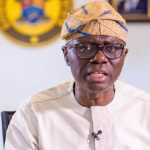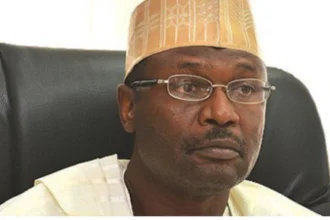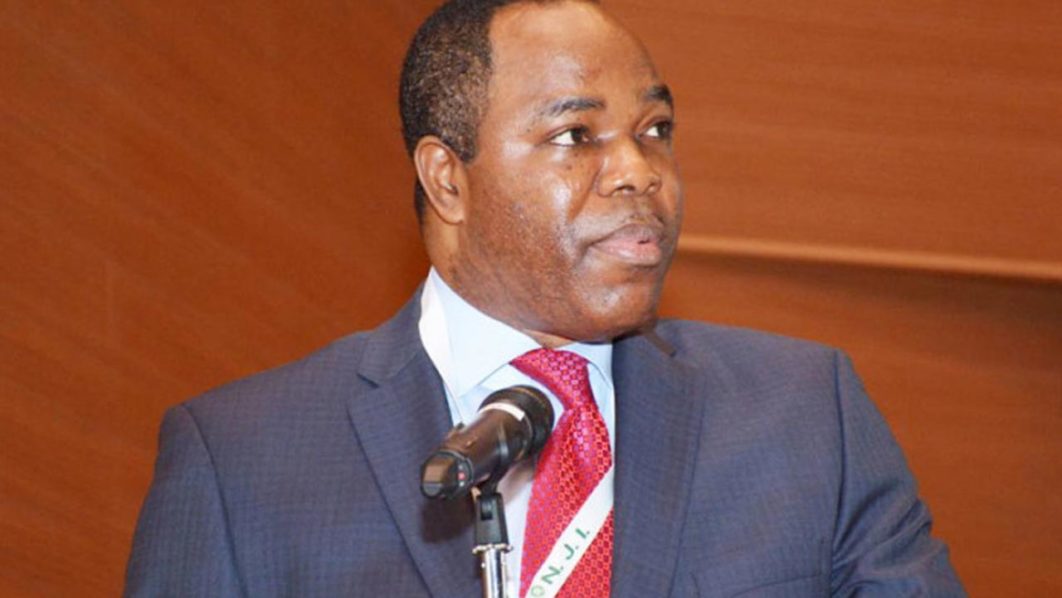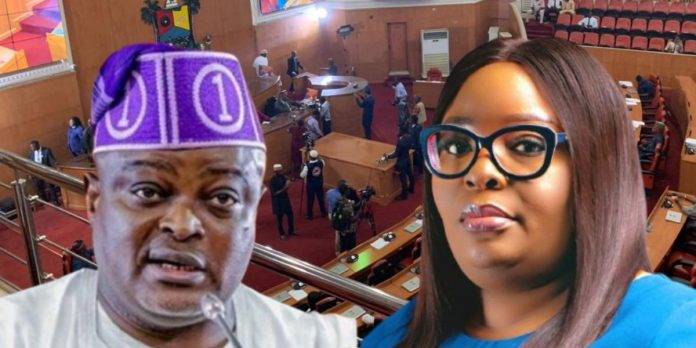...To get all news updates, Join our WhatsApp Group (Click Here)
Also Join our WhatsApp Channel (Click Here)
By Akudo Abengowe, Sam Fadipe, Godwin
If you have never heard of Kabiyesi Tegbuson, then you can meet him through this interview. Kabiyesi can be described as a man of many parts, a crown king, a blue blood, a civil engineer, an entrepreneur, a leader and a detribalized Nigerian, who has lived in and visited most states in Nigeria and speaks many languages as well. The first time I met Kabiyesi, he was looking like a regular man without the strappings of his office. He wore a white long gown and was very tired from his trip, though we had a few conversations with the other colleagues I went with, and then the interview was rescheduled for the next day. I got more curious after that visit and sought to find out more about Kabiyesi, of course, the internet had enough materials on him. However, nothing prepared me for the wealth of knowledge and deep insight that Kabiyesi has about almost every topic. His leadership values and principles are inspiring and should be replicated by every leader. His approach to issues especially relating to the development of his community should be imitated by every leader. When you read through this interview, you would understand why Kabiyesi is making landmark achievements in his community Owu-Kuta and for his people. In this interview however, Kabiyesi goes a bit deeper and reveals a little bit more about himself. Without much ado, let’s meet Oba Oyelude Tegbuson….
Your Majesty, let’s know a bit more about your background?
His Royal Majesty, Oba Hameed Adekunle Oyelude Makama Tegbosun III, I am the Olowu of Owu-kuta and the Chairman, Supreme Council of Owu Obas. I am a man of many parts. I was born in the north, grew up in the north. I grew up in Maiduguri partly and Zaria partly and served in Minna, Niger state. I am a civil engineer; I have my BSc in Civil Engineering. Even before I ascended the throne of my forebearers, I’ve been into construction. I have a registered construction company that I have been using for the past 25 years Kingroad Construction as far back as when I didn’t even know that destiny will toss it upon me among other things to be on the throne. Furthermore, I enjoy a very fraternal relationship with my friends and acquaintances up north. I could be qualified to be a true Nigerian because I have friends even in the east; valuable ones. You know if you call someone a valuable friend, you would have been together for quite a number of times, which I could call them valuable friends in the real sense of it and it has rubbed off positively on my community.
How was your growing up like?
Growing up, my father Prince Oyebayo Oyelude was a soldier. I was born in Abakaliki and taken to Maiduguri. I’ve never gone so deep into telling anyone because I’ve been waiting to drop it when I clock 10 years on the throne. If God spares our lives, I’ve planned a lot of activities. That’s the period I wish I could have come up with an autobiography and other things like that. Coincidentally, I was born in the east but brought up in the north. As a child, the first water a child will take, I took it in the east so I’m qualified as an easterner but not as a Biafran (laughs). Yes, I’m qualified as an easterner, so if Agalata must come, not that type of Agalata. Some years back, Eze Njemanze gave me Enyioha (Friend of all), he did not know I’m a prince that is entitled to the throne. If you look at the meaning of the title Enyioha first of all, it tells you about my personality and character. Eze Ndi Owerri Njemanze gave me Enyioha when I went to represent General Babangida in all the activities then. That was the day Rochas was launching the first Rochas Foundation School. I commissioned it on behalf of General Babangida.
I’m a Nigerian, a detribalized Nigerian. I believe in a united entity of this nation. I believe in togetherness; we can aspire to anything in this country and we can make this country great. I don’t believe we can do it all alone or individually. All the agitation is political, it’s strictly political. If any Igbo man is the president, nobody will call for the breaking if the country. When Obasanjo was there, there was no call for the country to break. No Yoruba man said he wanted to separate. So, it’s strictly political and I, with all sense of reasoning think if the country survived civil war, we will survive this one too.
Sir, what about your educational background?
I attended primary school, I attended secondary school. Like I told you earlier, next year, the activities would have taken up almost one week of planning for our 10 years anniversary on the throne. We have a lot of things to showcase; we’ve moved our community close to 100 years beyond where we met it. God has been merciful we’ve done that. For most of the things I’ve not told the media before, I believe that is the appropriate time to tell the media.
The prerequisite qualification for a traditional ruler is that he has to be a prince. Hence, I’m not applying to be a minister to describe the national assembly, so we’ll go deep into my biography when I want to do that. God will spare our lives; it’s going to be a week-long program that will attract Nigerians. East, North, South-south: you will see them there.
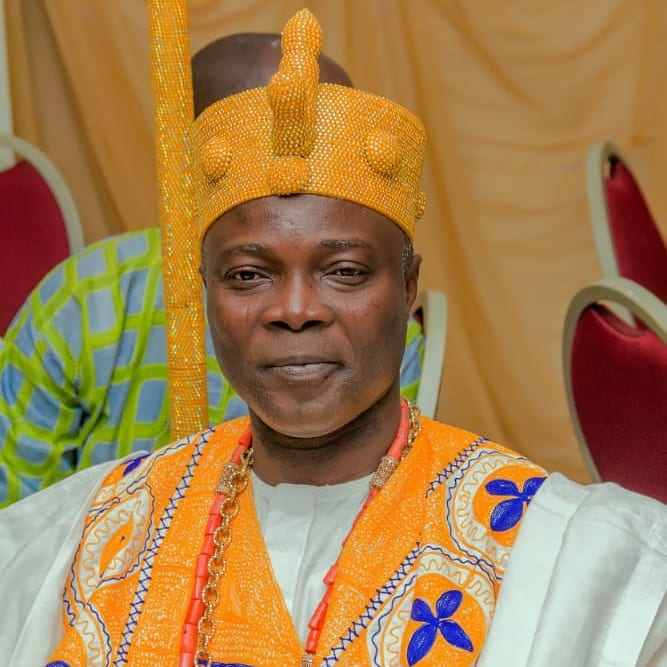
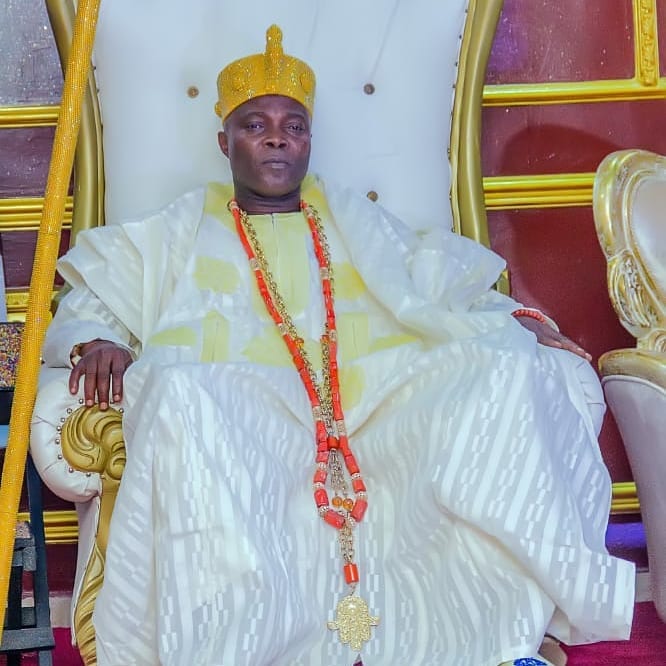
So, sir you don’t want to talk much about that?
I don’t want to go deep about that because a lot of work is ongoing, so don’t let me preempt those who are working on certain materials.
Sir, what about your leadership vision, policies and the rest?
As you are aware, ours is aristocratic, from generation to generation, ours is not like the real political leadership. Traditional institutions are aristocratic. If you are married to the family, you got a child, naturally he’s a blue blood, so the leadership is in-born. My philosophy about leadership at the traditional level where I am is a clear departure from the past. In the past during the time of our forebearers, the community serves the king but now we (the kings) serve the community. Gone are those days when the community serves the king with what they have. Those that didn’t have what to offer the king will use their bodies to farm for the king. As royalty, that’s what they do then, but now we strive hard to make sure we serve the community. Many people even forget that as a traditional ruler, you don’t have a budget like the local government chairman or the commissioner or governor. If your community does not have light, rather than going to the politician, they will go to the palace and say Kabiyesi, there’s no light.
I still have some classmates of mine that will be troubling me to find a contract for them and I’ll say no, it’s not like that. I can only offer them farmland. I can dash you a certain farmland to start farming. But as many of them do not know that my own philosophy on leadership at the traditional level is that I believe, perhaps because I’m the youngest to have ever found myself on the throne in my community as the 13th Olowu of Owu-kuta. Nobody of my age grade according to history has found himself there. I believe I should be a catalyst of development rather than just sitting back and counting time and the tenure of a traditional ruler ends when he sleeps and does not wake up, that’s when it ends. So, every day and every moment counts. No week or month passes by without me making any significant breakthrough in the community since my enthronement. So, my leadership has always been about giving back to the community, doing more, enticing and attracting one or two things to the community. I am always doing that and I forget every day that I have personal issues, I have kids. That is the way it’s going.
So Kabiyesi, how will you describe the current challenges facing traditional institutions in Nigeria, do you think the government is really paying much attention to the traditional institutions?
No, the government itself has missed it, the politicians missed it rather. In terms of welfare, the last administration that did a resemblance of welfare to the traditional institutions was General Abacha’s administration. It was during his time that a memo was issued that is still being followed till today. No other government has ever thought of any good thing for our traditional rulers other than the military administration of General Abacha. He said they should be given 5% of gross allocation to the local government. Out of that 5% they will remove salary and in a local government at times you will find 5 traditional rulers and in some you will find 20. In the east you will find autonomous. So, from that 5% all the traditional rulers are being paid, it’s not the state government that is paying them. It comes from the federation account. They will pay the traditional rulers then they will pay the chiefs stipends. The government got it wrong especially the civilian administration under the current democratic setting.
No constitutional rule is made for traditional institutions and no adequate welfare package while the citizens are expecting much from the traditional rulers. So, the traditional institution has not been faring well but it is striving hard to remain relevant. No more powerful traditional rulers; all we have now are influential traditional rulers. The colonial masters took most of the powers of traditional rulers away so as to subjugate us to their colonial mentality because they met us well organized under the traditional system. They met us well organized so they had to withdraw those powers from the traditional institutions. They vest our earlier politicians, the Awolowos, the Sardaunas. It was during the time of Awolowo they removed the first Alaafin, the father of the current Alaafin. It was during the time of Sardauna they removed the grandfather of Sanusi and if we dig into the archives, we will see what happened in the east and the far south. So, the first set of politicians had to crash the rest.
There is no chapter where the traditional institution is mentioned in the Nigerian constitution and if the traditional rulers are given their rightful place in the Nigerian constitution, the security situation that is overwhelming the country now will not be as bad as this. As a king, you will have district heads, you will have ward heads and you will have compound heads. If a visitor comes, the compound head will notify the compound about whose house the visitor sleeps. The compound head will forward it to the district head and the district head will forward it to the king and then we monitor with checks and balances. But now everything is just in the contrary. That is why I’ve always been advocating that this democracy we are practicing does not suit us. We don’t need to copy America hook, line and sinker. America’s presidential system does not suit us. We should sit down and fashion out our own system based on our peculiarity that will suit us. What is wrong after civil war from 1967 to 1970, what is wrong in ceding the presidency to the east? nothing! What is wrong in an Igbo man becoming chief of defense; becoming anything without hesitation in this country? Power should devolve from the federal. A lot of power is concentrated at the center. Devolution of power should come. There are people calling for restructuring, I don’t believe in restructuring, what are we restructuring? Let there be devolution of power. What is the Federal Government doing with marriage registry? What are they doing with agriculture at the federal level? Federal Government should remain with defense and external/ foreign affairs. Every other thing should come to the states. If the north does not want beer to be sold in their place, they should not share from the VAT and tax. That is devolution of power under true federalism. You say you want to apply Shari’a law. If an Igbo man has a depot of Nigerian brewery, Hisbah will go there and confiscate it and Nigerian brewery headquarters here pays VAT every month; billions and it will be shared across federation accounts and you are not rejecting yet you say one Nigeria. I think our intelligence in this country needs to really sit and say that we want true fiscal federalism, are we practicing it? Then let’s domesticate a system that will work for us. This Nigerian system was copied through Jimmy Carter, we don’t need to copy them. When we copy America, we say we lay fundamental human rights but when DJ Switch said there was genocide, she fled away. When it happened in America in Capitol, they said it was insurrection. That place that it was only one person who died, they said it was insurrection, homegrown terrorist. May God save us.
Sir I want to ask, you said there is no specific role of traditional rulers in the constitution but then the roles the traditional rulers are called to play or are expected to play in terms of solving crisis
(Cuts in) That is just a natural role. If there is a state law and ethics, not the Nigerian constitution, each state has law and ethics, every traditional ruler in Nigeria that is being appointed after being selected by the oracle or whichever means they use in their respective places. The natural role of which the government transcribe into the instrument of authority, they said it is to maintain culture and tradition. You see a traditional ruler that is walking and preaching the Bible, it is just an aberration; no traditional ruler in the south-west where I come from is being enthroned in the church, so we are not religious leaders. We are to maintain and preserve our culture and tradition. No traditional ruler is enthroned in the mosque in the south-west. In the east, they are also not enthroned in the church, strictly traditional institution.
That role is natural because an average traditional ruler that is a true traditional ruler has a connection with his ancestors and the land. So, the people will naturally pay obedience to him and if there is anything, there is a court in every palace. We met our forefathers doing it, average citizens will even prefer to go there than to even go to conventional courts that they will adjourn today and adjourn tomorrow and there will still be miscarriage of justice eventually but they know. Even a retired judge will prefer his case to be tried in the royal court than going to conventional courts because when they ask him to swear, he knows the consequences. One million people can swear with the Bible, one million people can swear with the Qur’an, nothing will happen.
Sir can you talk about the Nigeria of your dreams?
The Nigeria of my dream is a country where everybody will have an equal opportunity. Nigeria of my dreams is the nation where we will remain peaceful and coexist in harmony. A society where you don’t need to know anybody to attain any height in the country. On merit, you can attain any height, that is the country of my dream. The country of my dream is where you will not be asked where you are from before you merit something. Provided you are a Nigerian and a human being, you are qualified to be anything. Nigeria of my dream is where what happened to Obama in America, in Kenya to become the president of the most powerful country in the world won’t stop an Igbo man from becoming governor in Osun state in the future. It won’t stop an Osun man from becoming governor in Igbo land in the future. That is the country of my dreams.
Coincidentally, it is only the military that does that. The military will post a Hausa man to a core Yoruba state, post a Yoruba man to a core Fulani-dominated area and nothing will happen; everybody will keep quiet. A Nigeria that we will unite like the way we unite and watch football. You know when there is football, you don’t hear of Biafra or Oduduwa. You neither hear of Arewa, you hear one Nigeria. So why can’t we practicalize that in our coexistence. That is the Nigeria of my dream, where every national issue will not be mistaken for tribal sentiment.
Sir, I want to take a look at your vision, you said you want to transform Owu-kuta into a small London. So how far would you say you have gone in achieving that and what is that big milestone that you are expecting to do for your community?
I am moving at my own pace but I’ll leave majority of the answers to my subjects. They are the ones that are supposed to be answering that. It will be even left for me to blow my trumpet and I’m not used to that but I can conveniently without any fear of contradiction still repeat that I have taken Owu-kuta over many decades more than where I met it but I’ll remind you when you are in Kuta to go round and ask my subjects because I want to even have a feel; they are the ones to be answering that.
Your majesty, you are a philanthropist
(Cuts in) An Oba is not supposed to be a philanthropist, I’m just doing my little bit. Check the Bible, they will take from those who don’t even have to give those who have. That’s the definition of Oba; they will take from those who don’t have. If you don’t have in cash, you will have in farm crops, if you don’t have in farm crops, you will use your sweat to work for the king. What is the essence of tax? Who spends the tax? It is only that God put it in my mind that I should be doing the little I’m doing. That is why in Yoruba there is a proverb that there is no help me carry this load in the palace, it is help me drop this load.
That is the way our forefathers have been doing it. In their town, the same thing. If you have a farm, you have a lot to harvest and you want the king to have one out of it. It is proof of ownership that you are the owner of the land. It may be as small as one corn but they will take it there then and when you don’t even have, the elders will measure a portion of land for you to farm for the king. That’s why I said my own philosophy on leadership is different. We are the ones serving the community rather than the community serving us.
So, what propelled you to make that decision?
A lot of things. One, my community is an ancient community and with my exposure, I look at it that the community is lacking in many things so I really need to rally my subject’s round. What they expect from the political class, if they could find it at the royal palace, then that will be everything. I’m used to that due to my modern upbringing. I believe if a person mistakenly comes across me, he should have one thing or the other to say about me at the end of the day. Rather than doing juju or take money to one pastor that will gather it and buy plane, no matter how poor you are, if you have given, it is a big sacrifice. It is a big one rather than doing juju or giving pastor or alfa that you think is praying for you but is sleeping instead. Your giving is enough sacrifice. Not blood sacrifice, it’s about giving alms and it will work like magic.
Sir, this situation whereby you are doing a lot for your community and actually have the good of the community at heart then what will be the roles of the house of representatives and the people representing at the government level?
They are doing what they could do. In my case, most of the political appointees from my kingdom are always having me to contend with because of the pace at which I am moving. We have a representative, last week he was tarring a road, Oba’s constituency project; he said this is what I want. We have the chairman of the local government there. There is none of them that I give breathing space except they serve. If they don’t serve, we all ensure you don’t get there back because politically I owe my community and every reasonable leader, quote and unquote I will support the government of the day because they are the ones that have the budget to do good to your community. If you are a traditional ruler and you antagonize government, you are not the one to suffer it. You may have a way to feed yourself but your community will suffer it throughout the tenure of the administration that you antagonized as a traditional ruler. So,
my good relationship with the current administration is paying off for my community. There is nothing I will request for that they will not look at.
Sir, can you share some of your values with us
Like I told you, I am working on certain things and I will factor you people in. Some major editors are working on certain things. I will factor you people in. Your big brothers in the industry, the media are working on certain things for our 10 years anniversary. Some of them who are friends are doing selflessly. Some will commission to do it on consultancy basis because it’s going to be an elaborate one.
Of recently, there has been a push for the Oduduwa nation by Sunday Igboho. As a traditional ruler of the south-west and even the Alake of Egbaland is challenging Sunday Igboho to come down to Abeokuta. As a traditional ruler, are you in support of that action?
You will just have a simple answer. Creating a country or breaking a nation goes beyond mere telephone and data. Who are the people behind it? How many people have been consulted? Is it easy to create a country out of a country? If it were easy Ojukwu would have succeeded. If it were easy, when Awolowo did not become president he would have attempted something. This is just mere politics and it will pass.
Do you think that the man Sunday Igboho is exceeding his powers?
I don’t want to discuss about him, I don’t want to discuss Sunday Igboho. As far as I’m concerned, I’m a critical stakeholder by virtue of my position as a traditional ruler, every traditional ruler in this country is a stakeholder. How many traditional rulers have the so-called agitators held meetings with? Do you want us to be like Southern Sudan that fought themselves to a standstill after almost 20 years and the United Nations asked them to do a referendum and they voted? Then up till today, Osun state that is not as buoyant as Lagos state is more buoyant than Southern Sudan. Southern Sudan is suffering from hunger and famine today. Is that where you want us to go? No well-thinking Nigerian will say that at this crucial moment of our nation building, we should be thinking of unreasonable separation. Even in the east, a section of MASSOB is calling for separation. Uwuazurike is not calling for separation. Uwuazurike’s MASSOB has different faction and ideology contrary to the ESN case. Ask those who are calling for separation. Is it on the streets that the separation will come? Don’t they know the army barracks to protest there? Let them go to the army barracks to protest and I will know they are serious. Ojo cantonment in Lagos is there, Ikeja cantonment is there, so many. In Ibadan where the agitators are from, Odogbo cantonment is there. If I see them moving and marching to the army barracks, I will say yes, Oduduwa nation or they move to Obinze barracks, not inside the bush and say they are doing ESN. Go to the barracks and say we’ve come with our own odenigwe, no one Nigeria again; then all of us can say our sons and daughters are ready. I don’t think we are ready for that now. The country does not need it; we need prayers more; we need to be united.
When you say you don’t want one Nigeria, an election is happening and you are participating. Senator Abaribe stood surety for Nnamdi Kanu. Why doesn’t Nnamdi Kanu ask Abaribe to resign first and say we don’t want Nigeria? Abaribe is a senator of the Federal Republic of Nigeria. Let’s leave the aspect of Sunday Igboho for another time. Have you seen Nnamdi Kanu ask any senator to resign? Abaribe is the closest senator to him because he stood surety for him. Since his father died, Abaribe has been his next of kin till today. He did not ask Abaribe to resign from his position as Federal Government of Nigeria senator (laughs).
Sir, what’s your advice to Nigerians as we are going through economic “shakeup”
My advice to my fellow Nigerians and our subjects within the 6 geopolitical zones is that, we should be resolute. We should be patriotic at heart. Most of the prosperous nations have passed through more than this before. We will overcome it; it is a challenge in the course of nation building. The pandemic has made the world’s economy a little bit slow and worse but we’ve entered recession and come out of recession. If the economy is slow in developing but there is security, there will still be rest of mind and investors will come, but the insecurity is being heightened by the political class. So, our political class should have the fear of God and remember that we are all going to die and be answerable to God who sees all of us.
You can get every of our news as soon as they drop on WhatsApp ...To get all news updates, Join our WhatsApp Group (Click Here)
Also Join our WhatsApp Channel (Click Here)





